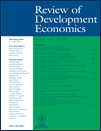
Review of Development Economics
Scope & Guideline
Advancing knowledge for impactful economic strategies.
Introduction
Aims and Scopes
- Empirical Analysis of Development Issues:
The journal emphasizes empirical studies that utilize quantitative and qualitative methodologies to investigate various aspects of economic development, including poverty, inequality, and welfare. - Interdisciplinary Approaches:
It encourages interdisciplinary research that integrates insights from economics, sociology, political science, and environmental studies to provide a holistic understanding of development. - Policy-Relevant Research:
The journal aims to produce research that is directly applicable to policy-making, addressing real-world challenges faced by developing economies. - Focus on Informality and Inclusivity:
A consistent theme is the examination of informal economies and inclusive growth strategies that consider marginalized populations and gender dynamics in economic development. - Regional Diversity:
The journal covers a wide range of geographical contexts, with a particular focus on Sub-Saharan Africa, Asia, and Latin America, offering insights into region-specific challenges and solutions.
Trending and Emerging
- Intersection of Technology and Development:
Recent publications emphasize the role of technology, especially digital financial inclusion and mobile payment systems, in enhancing economic opportunities and reducing poverty. - Climate Change and Sustainability:
There is a growing trend towards examining the impacts of climate change on development, with studies exploring sustainable practices and policies that mitigate environmental degradation. - Gender Dynamics in Development:
Research focusing on gender issues, including women's labor force participation and the impacts of gendered policies, is gaining prominence, reflecting a broader commitment to inclusivity in economic growth. - Informality and its Economic Impacts:
The journal is increasingly addressing the complexities of informal economies, highlighting their significance in understanding overall economic dynamics and policy effectiveness. - Migration and Its Economic Consequences:
Emerging themes include the economic implications of migration, remittances, and their effects on both sending and receiving countries, indicating a shift in focus from traditional labor market analyses.
Declining or Waning
- Traditional Economic Growth Models:
There seems to be a decline in the focus on classical economic growth theories without integration of contemporary issues such as climate change and social inequality, indicating a shift towards more nuanced frameworks. - Sector-Specific Analyses:
Research solely focusing on specific sectors (like agriculture or manufacturing) without considering their interconnections with technology, policy, and global dynamics appears to be less prevalent. - Monolithic Views on Poverty:
The traditional view of poverty as a uniform condition is being replaced by more complex, multidimensional perspectives, leading to a reduction in studies that treat poverty as a singular metric. - Neglect of Macro-Level Analyses:
There is a noticeable reduction in macroeconomic analyses that do not incorporate micro-level data, as the journal increasingly favors studies that connect macroeconomic trends with individual or household-level outcomes. - Underrepresentation of Non-Empirical Studies:
The journal has seen a decline in the publication of theoretical discussions or non-empirical studies, as there is a stronger emphasis on empirical evidence and applications.
Similar Journals
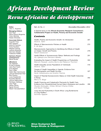
AFRICAN DEVELOPMENT REVIEW-REVUE AFRICAINE DE DEVELOPPEMENT
Illuminating Africa's Development DynamicsAFRICAN DEVELOPMENT REVIEW - REVUE AFRICAINE DE DEVELOPPEMENT is a premier academic journal dedicated to the field of development studies, published by Wiley. With a focus on the complex dynamics of sustainable development on the African continent, this journal aims to disseminate high-quality research that informs policy and scholarly discourse. Established in 1989, it has consistently maintained its reputation, ranking in the Q1 category for development in 2023, and achieving an impressive 85th percentile rank in the Scopus Social Sciences category. Although it does not currently offer open access, the journal provides a vital platform for researchers, practitioners, and students to explore innovative ideas and interventions aimed at addressing Africa's development challenges. The journal's ISSN is 1017-6772 and its E-ISSN is 1467-8268, reflecting its commitment to providing a scholarly outlet for rigorous analysis and dialogue. For the latest insights and developments, the AFRICAN DEVELOPMENT REVIEW remains an essential resource, fostering a deeper understanding of the trajectories shaping African nations into the future.
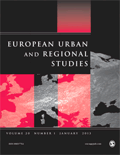
EUROPEAN URBAN AND REGIONAL STUDIES
Pioneering Research in Urban and Regional TransformationEUROPEAN URBAN AND REGIONAL STUDIES is a premier journal dedicated to advancing the field of urban and regional studies, published by SAGE PUBLICATIONS LTD, a distinguished publisher renowned for its contributions to scholarly communications. Established in 1994 and running through 2024, this journal provides a vital platform for interdisciplinary research that addresses the complexities of urban environments and regional developments across Europe and beyond. It holds impressive distinctions, ranking in the Q1 category for both Environmental Science and Urban Studies in 2023, reflecting its strong impact and influence—ranked #31 out of 279 and #42 out of 219 in Scopus, respectively. Scholars and practitioners seeking to contribute to or stay informed on trends in sustainable urban development, policy-making, and regional planning will find this journal indispensable. Its contributions not only shed light on pressing urban issues but also cultivate a dialogue that bridges theory and practice. Enhance your understanding of contemporary urban challenges by engaging with the rich tapestry of research published in this esteemed journal.
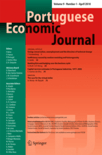
Portuguese Economic Journal
Pioneering Research in the Heart of Economic DiscourseWelcome to the Portuguese Economic Journal, a renowned publication in the field of economics, published by SPRINGER HEIDELBERG. With an ISSN of 1617-982X and flexible access options, this journal serves as a pivotal platform for both established and emerging researchers. Spanning a broad range of topics within Economics, Econometrics, and Finance, the journal has successfully converged from 2005 to 2024, positioning itself in Q3 for Economics and Econometrics and Q2 in Economics, Econometrics and Finance (miscellaneous) as per the latest 2023 category quartiles. It is ranked 68th out of 288 in the Scopus list for General Economics, highlighting its significant place in the academic landscape. Based in Germany, the journal fosters a global dialogue on economic issues, making it an invaluable resource for researchers, professionals, and students seeking to engage with contemporary economic discussions. Join our community as we explore innovative economic theories, data-driven analyses, and practical applications to contribute to the advancement of the field.
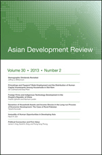
Asian Development Review
Unveiling the Dynamics of Development in Asian EconomiesThe Asian Development Review, published by World Scientific Publishing Co Pte Ltd, is a distinguished journal that has been at the forefront of scholarly discourse in the fields of development, economics, and geography since its inception in 1987. With an Open Access model adopted in 2013, this journal strives to enhance the accessibility of high-quality research, facilitating a broader dissemination of vital knowledge and insights that address pressing socio-economic challenges across the Asian landscape. The journal is classified in the Q2 Quartile category for 2023 in Development, Economics and Econometrics, as well as Geography, Planning, and Development, reflecting its substantial contribution to these fields. The journal also holds respectable rankings in Scopus, placing it in the top 45-55th percentile across various disciplines. Researchers, professionals, and students are encouraged to explore the wealth of research and methodologies presented in this impactful publication, which not only seeks to illuminate current issues but also aims to inform policy and practice across the Asian region.

South East European Journal of Economics and Business
Navigating Challenges, Inspiring Solutions.South East European Journal of Economics and Business (ISSN: 1840-118X, E-ISSN: 2233-1999), published by WALTER DE GRUYTER GMBH, stands as a pivotal platform for the dissemination of innovative research in the fields of economics, business, management, and accounting. Since its inception in 2007, this Open Access journal has provided unrestricted access to a wealth of knowledge generated by scholars and practitioners alike, enriching the academic landscape in the South East European region and beyond. Located in Bosnia and Herzegovina, the journal has consistently aimed to foster interdisciplinary dialogue among researchers, offering insights into current trends and challenges facing the global economy. The journal's impressive positioning in the Q3 quartile for both Business and Economics categories, alongside its Scopus ranks—#103/288 in Economics and #118/218 in Business, reflects its commitment to high-quality research. By continually evolving to meet the demands of its academic audience, the South East European Journal of Economics and Business is poised to make significant contributions to its fields, engaging professionals, researchers, and students who desire to stay at the forefront of economic and business advancements.

Forum for Social Economics
Advancing Insights into Social Economic DynamicsForum for Social Economics is a premier academic journal published by Routledge Journals, Taylor & Francis Ltd, dedicated to advancing the discourse in social economics, a field that bridges the gap between economic theory and social realities. With an ISSN of 0736-0932 and an E-ISSN of 1874-6381, this journal serves as a vital resource for researchers, professionals, and students interested in the multifaceted intersections of economic and social phenomena. Recognized for its academic rigor, it holds a Q3 ranking in Economics and Econometrics and Q2 in Sociology and Political Science as of 2023, further emphasizing its influential position within these disciplines. Although not open access, the journal offers a wealth of insightful articles and empirical studies, fostering a deeper understanding of social issues through an economic lens. Since its inception in 1971 and with convergence years extending to 2024, the Forum for Social Economics continues to attract contributions that provoke critical thought and innovation in economic research. Based in the United States, the journal is pivotal for those looking to explore and contribute to the evolving landscape of social economics.
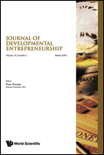
Journal of Developmental Entrepreneurship
Unlocking Potential in Evolving Markets Through Research.The Journal of Developmental Entrepreneurship, published by World Scientific Publishing Co Pte Ltd, serves as a vital scholarly outlet for the exploration of enterprise development in evolving economies. With an ISSN of 1084-9467 and an e-ISSN of 1793-706X, this journal has positioned itself at the intersection of Business and International Management, Economics and Econometrics, and Strategy and Management, earning a commendable Q3 ranking across these domains in 2023. The journal’s focus on developmental entrepreneurship aids researchers and practitioners in understanding the complexities of economic growth and sustainable development strategies, particularly in emerging markets. Though not an open-access publication, it provides significant insights and empirical findings that help shape policy and academic discourse. As it converges from 2008 to 2024, the Journal of Developmental Entrepreneurship remains a crucial platform for those looking to bridge theory and practice in the rapidly evolving landscape of global entrepreneurship.
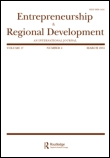
ENTREPRENEURSHIP AND REGIONAL DEVELOPMENT
Illuminating Pathways to Regional Economic SuccessEntrepreneurship and Regional Development is a prestigious academic journal published by Routledge Journals, Taylor & Francis Ltd, with a significant influence in the fields of business and international management, development, and economics. Established in 1989, this journal has dedicated itself to advancing knowledge and scholarship by exploring the intricate relationships between entrepreneurship and regional development dynamics. With its commendable Q1 status across multiple categories in 2023 and a strong ranking in Scopus, it positions itself among the elite in its domain, making it a vital resource for researchers, professionals, and students alike. Although it is not an Open Access journal, its robust subscription base ensures widespread accessibility to cutting-edge research. The journal aims to highlight innovative empirical research and theoretical advancements, contributing to the understanding of how entrepreneurship fuels economic growth and regional sustainability. As such, Entrepreneurship and Regional Development plays a crucial role in shaping policy and practice across academic, governmental, and community environments.
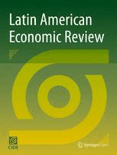
Latin American Economic Review
Illuminating Economic Pathways for the RegionLatin American Economic Review, published by CENTRO INVESTIGACION & DOCENCIA ECONOMICAS-CIDE, is a pioneering open-access journal that has been contributing to the field of economics since its establishment in 2014. With a focus on the diverse economic landscapes of Latin America, it aims to foster a rich dialogue among researchers, policymakers, and practitioners about pressing economic issues and innovative solutions. The journal, which holds an ISSN of 2198-3526 and an E-ISSN of 2196-436X, provides an accessible platform for the dissemination of high-quality research, reflecting a commitment to advancing knowledge in the realms of economics, econometrics, and finance. Though currently positioned in the Q4 category in Economics within Scopus rankings, it continues to evolve, providing valuable insights and fostering collaboration across various disciplines. The journal's open access model enhances its reach, allowing unrestricted availability of content to researchers and practitioners worldwide. As the journal converges through its second decade (2014-2024), it remains dedicated to promoting critical analysis and discussion on economic challenges and policies that affect the region and beyond.
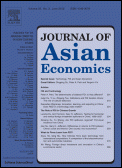
Journal of Asian Economics
Exploring the Dynamics of Asian EconomiesThe Journal of Asian Economics, published by Elsevier, serves as a pivotal platform for scholars and practitioners engaged in the comprehensive study of economic issues within Asia. With an ISSN of 1049-0078 and an E-ISSN of 1873-7927, this esteemed journal encompasses a wide array of topics in its scope, ranging from macroeconomic policy analysis to the intricacies of financial markets in the Asian context. Ranking in the Q2 category for both Economics and Econometrics and Finance, according to the 2023 metrics, it is positioned among the top-tier journals, currently holding a significant place at the 73rd percentile in Finance and 72nd percentile in Economics. This journal not only caters to academic researchers looking to publish their findings but also serves as an essential resource for professionals and students seeking to deepen their understanding of the dynamic economic landscape in Asia. By bridging empirical research and practical insights, the Journal of Asian Economics plays a crucial role in advancing knowledge and encouraging discourse in the field.